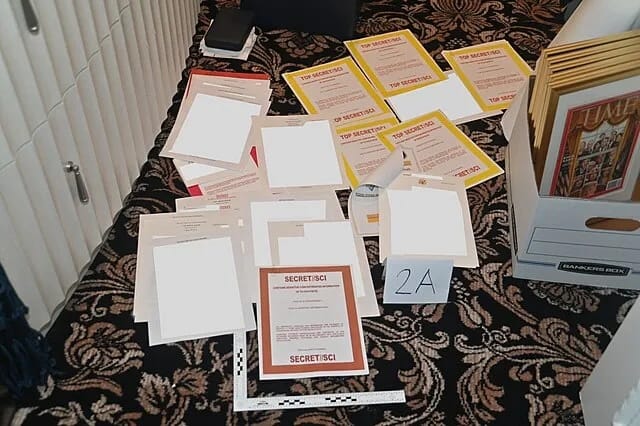In a governmental context, Classified information refers to national security information that has been formally determined (under executive orders or laws) to require protection against unauthorized disclosure. It is marked with classification levels such as Confidential, Secret, or Top Secret.
Only individuals with the proper security clearance and a demonstrated need to know are allowed to access classified material. It covers information that, if disclosed, could damage national security, foreign relations, or organizational integrity.
Documents are labeled to indicate classification level and handling requirements. An example would be the classified material found at Mar-a-Lago, which was clearly marked. Distribution is limited to cleared individuals or secure channels.
The Epstein Files Transparency Act was passed in the House and Senate and signed into law by the President. The Act mandates the Department of Justice (DOJ) to publish all unclassified documents, communications, and investigative materials related to Epstein within 30 days of the law’s signing. Files that are formally classified for national security reasons are not subject to public release. The DOJ retains discretion to withhold such materials.
Since first seeing the language of the Act, I’ve wondered what information in the files could possibly be classified, given that the primary goal is to reveal and potentially prosecute pedophiles. What is the national interest in hiding information?
One such secret could be any records showing ties between Epstein and U.S. or foreign intelligence agencies. There have long been rumors about Jeffrey Epstein’s ties to foreign intelligence agencies, with a focus primarily on alleged connections to Israeli intelligence (Mossad), with occasional speculation about U.S. (CIA) or Russian involvement. These claims remain unproven but have been fueled by leaked documents, suspicious business partnerships, and the secrecy surrounding Epstein’s activities.
Multiple outlets have reported Epstein’s close relationship with former Israeli Prime Minister Ehud Barak, including investments in a security tech firm later renamed Carbyne, which had ties to Israeli intelligence. Some conspiracy theories suggest Epstein was protected because of ties to the CIA, possibly as an informant or asset.
Public suspicion also extends to Russia, with polls showing many Americans believe Epstein may have collaborated with foreign intelligence services, including Russian agencies.
Another category of secrets could include the identities of informants, witnesses, or victims under protection programs. I can see these names being redacted to safeguard lives and ongoing investigations, though it seems there were none until Donald Trump ordered some opened against Bill Clinton, Larry Summers, and a few other Democrats, as well as a financial institution.
The category that concerns me most is protected individuals who would prove embarrassing to the administration or deemed too critical to government operations or the stability of the country—people who are too big to jail. These might include friends of the President, wealthy people whose corporations are significant suppliers to the government, and possibly Donald Trump himself? Will the Attorney General decide the country shouldn’t see the very types of names the nation wants to see most?
The inconvenience of revealing the names of wealthy and powerful figures in the Epstein files lies in the collision between public transparency, survivor justice, and the entrenched protections of elite networks.
Many names may appear in logs, correspondence, or financial records without direct evidence of criminal activity. Public release risks defamation lawsuits if individuals argue their inclusion is misleading or taken out of context. Courts need to balance First Amendment transparency against privacy and reputational rights.
If elected officials or major donors are named, disclosure could destabilize political alliances. Governments may resist release to avoid diplomatic embarrassment if foreign leaders or dignitaries are implicated. Joe Biden and, to a far greater degree, Donald Trump have ignored that Mohammed bin Salman ordered the operation in which Washington Post columnist Jamal Khashoggi was captured and killed. If we, as a country, can ignore murder, how hard is it to ignore pedophiles?
CEOs, financiers, and celebrities tied to Epstein could face stock market consequences if their companies’ reputations collapse. Industries like entertainment, tech, and finance may lobby to limit exposure to protect brand value.
The government may never release some sensitive names, particularly if one is the sitting President. That decision may be overridden by the survivors who are already in discussions with attorneys to release the names they know on their own. Will the Justice Department threaten or prosecute the survivors if they name the men who raped and assaulted them?
I’m speculating the survivors won’t give a damn about the government wanting to hide any names based on classified information. I’m not talking about someone mentioned tangentially, but someone who a survivor has credibly pointed the finger at. These sexual predators have gotten a twenty-year reprieve, and it’s time for their reckoning.
There is no valid reason that any of the information should be classified, though some should be redacted. Prince Andrew has faced no criminal consequences but has been named and shamed, with the Commonwealth still standing. America can survive the naming of child rapists, no matter how rich and powerful.
This post originally appeared on Medium and is edited and republished with author's permission. Read more of William Spivey's work on Medium. And if you dig his words, buy the man a coffee.
